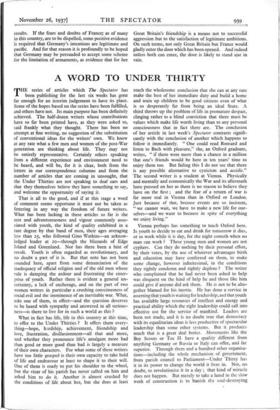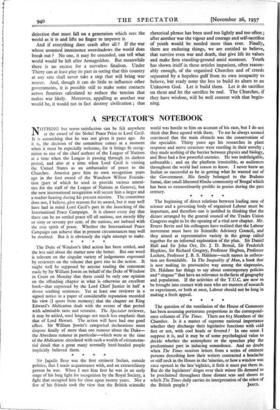A WORD TO UNDER THIRTY
THE series of articles which The Spectator has been publishing for the last six weeks has gone far enough for an interim judgement to have its place. Some of the hopes based on the series have been fulfilled, and others have not. Its main purpose has been definitely achieved. The half-dozen writers whose contributions have so far been printed have, as they were asked to, said frankly what they thought. There has been no attempt at fine writing, no suggestion of the substitution of conventional ideas for the writers' own. We know at any rate what a few men and women of the post-War generation are thinking about life. They may not be entirely representative. Certainly others speaking from a different experience and environment need to be heard, and will be, for it is clear, both from the letters in our correspondence columns and from the number of articles that are coming in unsought, that the Under Thirties are not speaking to deaf ears and that they themselves believe they have something to say, and welcome the opportunity of saying it.
That is all to the good, and if at this stage a word of comment seems opportune it must not be taken as fettering in any way the freedom of future writers. What has been lacking in these articles so far is the zest and adventurousness and vigour commonly asso- ciated with youth, the kind of quality exhibited in a. rare degree by that band of men, their ages averaging less than 25, who followed Gino Watkins—an acknow- ledged leader at 2o—through the blizzards of Edge Island and Greenland. Nor has there been a hint of revolt. Youth is often regarded as revolutionary, and no doubt a part of it is. But that note has not been sounded here, apart from some denunciation of the inadequacy of official religion and of the old men whose rule is damping the ardour and frustrating the enter- prise of youth. Rather there is evident a general un- certainty, a lack of anchorage, and on the part of two women writers in particular a crushing consciousness of social evil and the imminence of an inevitable war. What, asks one of them, in effect—and the question deserves to be heard with sympathy and answered in all serious- ness—is there to live for in such a world as this ?
What in fact has life, life in this country at this time, to offer to the Under Thirties ? It offers them every- thing—hope, hirdship, achievement, friendship and love, frustration, disillusionment—all that and more, and whether they pronounce life's amalgam more bad than good or more good than bad is largely a measure of their own characters. For what some of these writers have too little grasped is their own capacity to take hold of life and endeavour at least to shape it to their will. One of them is ready to put his shoulder to the wheel, but the vicar of his parish has never called on him and asked him to do it. Another is almost _crushed by the conditions of life about her, but she does at least reach the wholesome conclusion that she can at any rate make the best of her immediate duty and build a home and train up children to be good citizens even of what is so desperately far from being an ideal State. A third throws up the problem of life in premature despair, clinging rather to a blind conviction that there must be values which make life worth living than to any personal consciousness that in fact there are. The conclusion of her article in last week's Spectator contrasts signifi- cantly with the conclusion of another which happens to follow it immediately. " One could read Ronsard and listen to Bach with pleasure," she, an Oxford graduate, writes, " if there were more than a chance in a million that one's friends would be here in ten years' time to enjoy them too. But failing this I do not see that there is any possible alternative to cynicism and accidie." The second writer is a student at Vienna. Physically and mentally and economically the War and its aftermath have pressed on her as there is no reason to believe they have on the first ; and the fear of a return of war is far more real in Vienna than in Oxford or London. Just because of that, because events are so insistent, " we cannot wait, we have to make a new life for our- selves—and we want to because in spite of everything we enjoy living."
Vienna perhaps has something to teach Oxford here. Is youth to decide to eat and drink for tomorrow it dies, or to work while it is day, for the night cometh when no man can work ? These young men and women are not cyphers. Can they do nothing by their personal effort, by their votes, by the use of whatever advantages birth and education may have conferred on them, to make some change, however infinitesimal, in the conditions they rightly condemn and rightly deplore ? The writer who complained that he had never been asked to help was eloquent on the kind of help he and those like him could give if anyone did ask them. He is not to be alto- gether blamed for his inertia. He has done a service in asserting that youth is waiting for leadership, and that youth has available large resources of intellect and energy and practical ability which the right leadership could call into effective use for the service of mankind. Leaders are born not made, and it is no doubt true that demociacy with its equalitarian ideas is less productive of spectacular leadership than some other systems. But it produces much that is a great deal better. Movements like the Boy Scouts or Toc H. have a quality different from anything Germany or Russia or Italy can offer, and far superior. Through them and a hundred other organisa- tions—including the whole mechanism of government, from parish council to Parliament—Under Thirty has it in its power to change the world it lives in. Not, no doubt, to revolutionise it in a day ; that kind of miracle does not happen. But merely to take a hand in the slow work of construction is to banish the soul-destroying dejection that must fall on a generation which sees the world as it is and lifts no finger to improve it.
And if everything does crash after all ? If the war whose assumed imminence overshadows the world does break out ? No one, it may be conceded, can tell what world would be left after Armageddon. But meanwhile there is no excuse for a nerveless fatalism. Under Thirty can at least play its part in seeing that this country at any rate shall never take a step that will bring war nearer. And, though it can do little to influence other governments, it is possible still to make some contacts across frontiers calculated to reduce the tension that makes war likely. Moreover, appalling as another war would be, it would not in fact destroy civilisation ; that rhetorical phrase has been used too lightly and too often ; after another war the vigour and courage and self-sacrifice of youth would be needed more than ever. Finally, there are enduring things, we are entitled to believe, that survive even war and death, that give life its values and make firm standing-ground amid morasses. Youth has shown itself in these articles impatient, often reason- ably enough, of the organised Churches and of creeds separated by a hopeless gulf from its own incapacity to believe, but ready none the less to build its altars to an Unknown God. Let it build them. Let it do sacrifice on them and let the sacrifice be real. The Churches, if they have wisdom, will be well content with that begin- ning.















































 Previous page
Previous page